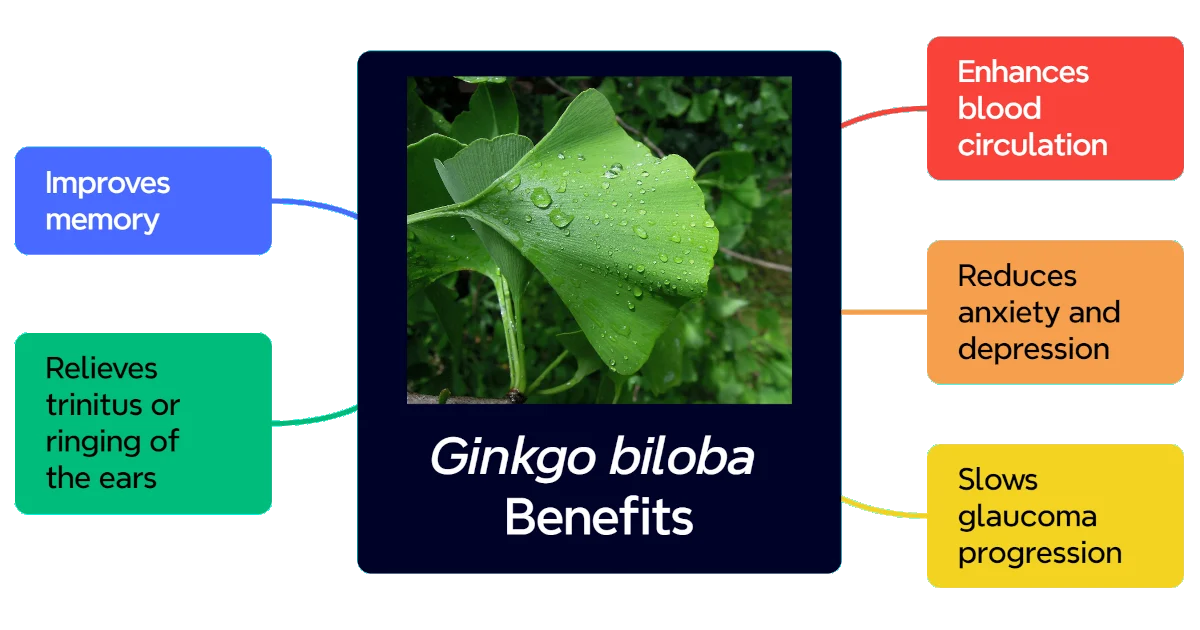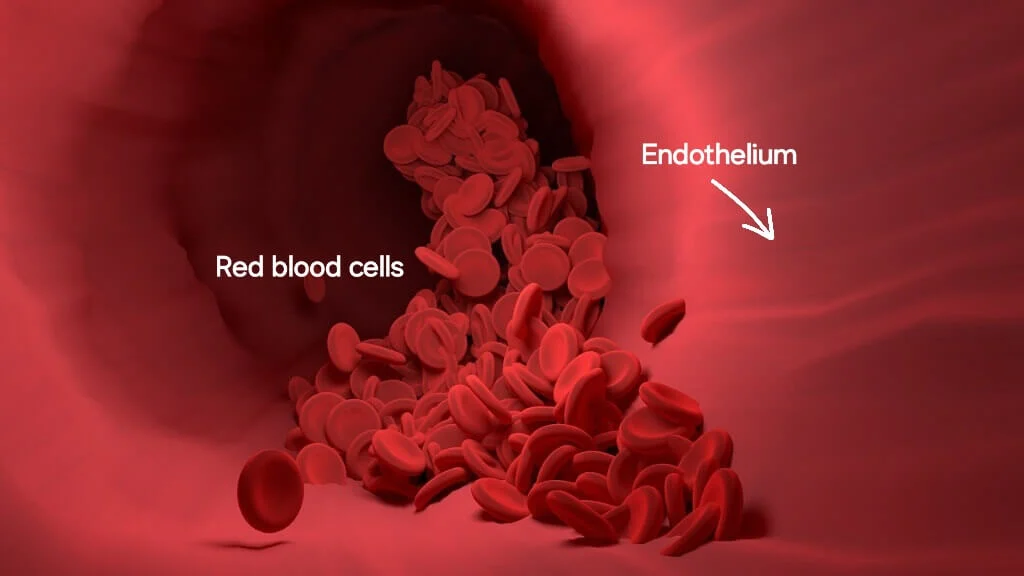Reviewed and edited by P. A. Regoniel

Table of Contents
Introduction

Ginkgo biloba, often called the maidenhair tree, is one of the oldest living tree species on Earth, with a history spanning over 200 million years. Native to China, this “living fossil” has been revered in traditional medicine for thousands of years and is now one of the most widely studied and consumed herbal supplements worldwide. Its fan-shaped leaves contain bioactive compounds linked to cognitive support, antioxidant protection, and improved circulation. While scientific findings on its efficacy remain mixed, ginkgo continues to hold an important place in natural health practices.
This article provides a detailed look at ginkgo biloba’s historical and botanical background, mechanisms of action, benefits, risks, and recommended use.
Historical and Botanical Background
Ginkgo biloba is the sole surviving member of the ancient plant family Ginkgoaceae, which thrived during the Jurassic period. Some ginkgo trees can live for over 1,000 years, demonstrating remarkable resilience to pollution, pests, and even radiation.
In traditional Chinese medicine, ginkgo seeds—not leaves—were used to treat respiratory and digestive conditions. Today, supplements are derived from the leaves, which contain flavonoids (antioxidants) and terpenoids (anti-inflammatory compounds). The most studied form is the standardized extract EGb 761, which contains 24% flavonoid glycosides and 6% terpene lactones.
How Ginkgo Works in the Body
The health benefits of Ginkgo biloba come from special natural chemicals in its leaves. These chemicals affect the body in three main ways:
1. Improved Blood Flow
Ginkgo helps blood move more freely by relaxing and widening blood vessels. It also makes platelets (tiny cells that help blood clot) less sticky, reducing the chances of clumping. This means more oxygen and nutrients can reach the brain, hands, and feet.

Better blood circulation may explain why some people take ginkgo to support memory, concentration, and leg pain caused by poor circulation.
2. Antioxidant Protection
Our bodies constantly produce unstable molecules called free radicals—byproducts of stress, pollution, and even normal metabolism. Over time, free radicals damage cells and speed up aging.
The flavonoids in ginkgo act as antioxidants, neutralizing these free radicals before they can cause harm. This protective effect may help slow down cell damage in the brain and eyes, which is why ginkgo is studied for memory loss and vision problems.
3. Brain Support (Neuroprotection)
Ginkgo contains terpenoids, compounds that calm down excessive inflammation and prevent harmful clots from forming. These compounds also seem to balance important brain chemicals, like serotonin and dopamine, which affect mood, memory, and focus.
In this way, ginkgo may offer gentle support for mental clarity, emotional balance, and overall brain health.
Five Evidence-Based Ginkgo Benefits
There are studies that support ginkgo benefits although there are also findings that negate its effects for some reason. I enumerate the benefits and scientific findings about them. Make your own judgment.
1. Cognitive Health
Research suggests ginkgo may improve memory, attention, and executive function in healthy adults, especially under stress or fatigue (Kaschel, 2009; McKeage and Lyseng-Williamson, 2018). However, results are modest and inconsistent (Laws, et al., 2012).
In age-related cognitive decline and Alzheimer’s disease, findings are mixed. Some clinical trials show slight improvements in dementia symptoms, while others find no significant effect. The 2012 Ginkgo Evaluation of Memory or GEM Study is a case in point. It concluded that ginkgo did not prevent Alzheimer’s disease in older adults.
The GEM study was a large-scale, randomized, double-blind, placebo-controlled clinical trial aimed at determining whether Ginkgo biloba could prevent dementia, including Alzheimer’s disease, in older adults (Hilton and Stuart, 2004). The study was conducted over approximately six years and involved 3,069 participants aged 75 and older. Participants received either 120 mg of Ginkgo biloba extract twice daily or a placebo. The study concluded that Ginkgo biloba did not reduce the incidence of dementia or Alzheimer’s disease compared to the placebo group.
Additionally, subsequent analyses published in 2012 in The Lancet Neurology supported these findings, indicating that Ginkgo biloba extract does not significantly lower the chance of an Alzheimer’s diagnosis in older individuals.
However, it must be pointed out that after acute administration, ginkgo improved performance in tests of attention and memory in young, healthy participants of a study. However, there were no effects after 6 weeks, suggesting that tolerance develops to the effects in young, healthy participants (Elsabagh et al., 2005).
2. Tinnitus and Vertigo
Ginkgo biloba is commonly marketed as a natural remedy for tinnitus (the perception of ringing, buzzing, or hissing in the ears) and dizziness, conditions often linked to inner ear or circulation issues. Many people who use ginkgo supplements report some relief, which has contributed to its popularity as an alternative treatment.
However, when these claims are tested in well-designed clinical trials, the results are far less convincing. A 2004 Cochrane Review found no strong evidence that ginkgo is more effective than a placebo in treating tinnitus in the general population, though a possible benefit was noted in people with dementia-related tinnitus (Hilton & Stuart, 2004).
In a later review of scientific studies and systematic reviews with humans published between January 2000 and November 2021, Ginkgo biloba was the identified as the most relevant nootropic regarding perceptual and motor functions (Lorca et al., 2023). A nootropic is a substance that improves attention, memory, wakefulness, and self-control.
In short, ginkgo’s role in managing tinnitus and dizziness remains uncertain. People who wish to try it should do so cautiously, be aware of potential interactions with medications, and consult a healthcare provider first.
3. Peripheral Artery Disease (PAD)
By enhancing circulation, ginkgo may reduce leg pain and improve walking distance in people with peripheral artery disease or PAD. However, the effects are generally weaker than those of prescription treatments (Gardner et al., 2008).
4. Anxiety and Depression
Preliminary studies suggest ginkgo may help reduce anxiety symptoms and improve the effectiveness of antidepressants. More robust research is needed to confirm these findings (Zhang et al., 2022).
5. Eye Health
Some evidence indicates ginkgo may slow the progression of glaucoma and age-related macular degeneration by improving blood flow to the eyes (Labkovich et al., 2020) but another finding found no significant improvement (Hodgson et al., 2025).
This list of ginkgo or maidenhair tree benefits opens another area of alternative medicine research to scientifically substantiate of its traditional uses. Since its use has spanned generations, ginkgo benefits to health could not be ignored.
Safety and Side Effects
Ginkgo biloba is generally safe for most adults when taken in recommended doses (120–240 mg daily). Potential risks include:
- Bleeding Risks – Ginkgo inhibits platelet aggregation, which can increase the risk of bruising or bleeding, especially when combined with blood thinners (warfarin, aspirin) or NSAIDs.
- Allergic Reactions – Rare cases of skin rashes or gastrointestinal upset have been reported.
- Drug Interactions – Ginkgo may reduce the effectiveness of anticonvulsants or increase sedation when used with SSRIs.
- Pregnancy Concerns – Not recommended during pregnancy due to possible uterine stimulation.
Dosage and Product Quality
- Standardized Extracts – Look for products labeled EGb 761 or those containing 24% flavonoids and 6% terpenoids.
- Typical Dose – 120–240 mg daily, divided into two to three doses. Benefits may take 4–6 weeks to appear.
- Quality Control – Choose brands certified by third-party organizations such as USP, NSF, or ConsumerLab. Avoid raw leaf teas, which may contain toxic ginkgolic acids.
Controversies and Limitations
Despite its popularity, ginkgo remains controversial because many early studies were small, short-term, or industry-funded, raising concerns about bias. Also, there is inconsistency in the manufacturing standards of ginkgo biloba extracts. This means that supplement potency can vary widely across individuals who may also have different tolerances.
Conclusion
Ginkgo biloba is a fascinating herbal supplement with a long history of medicinal use. It shows potential benefits for circulation, antioxidant protection, and cognitive health, but scientific evidence remains inconclusive. Its effects are generally mild and vary among individuals.
Those considering ginkgo should consult a healthcare provider, particularly if taking medications or managing bleeding disorders. While ginkgo offers supportive benefits, it should not replace evidence-based strategies for brain health such as a balanced diet, regular exercise, and mental stimulation.
References
DeKosky, S. T., Fitzpatrick, A., Ives, D. G., Saxton, J., Williamson, J., Lopez, O. L., … & GEMS investigators. (2006). The Ginkgo Evaluation of Memory (GEM) study: design and baseline data of a randomized trial of Ginkgo biloba extract in prevention of dementia. Contemporary Clinical Trials, 27(3), 238-253.
Elsabagh, S., Hartley, D. E., Ali, O., Williamson, E. M., & File, S. E. (2005). Differential cognitive effects of Ginkgo biloba after acute and chronic treatment in healthy young volunteers. Psychopharmacology, 179(2), 437-446.
Gardner, C. D., Taylor-Piliae, R. E., Kiazand, A., Nicholus, J., Rigby, A. J., & Farquhar, J. W. (2008). Effect of Ginkgo biloba (EGb 761) on treadmill walking time among adults with peripheral artery disease: a randomized clinical trial: A randomized clinical trial. Journal of Cardiopulmonary Rehabilitation and Prevention, 28(4), 258–265.
Hilton M, Stuart E. Ginkgo biloba for tinnitus. Cochrane Database Syst Rev. 2004;(2):CD003852. doi: 10.1002/14651858.CD003852.pub2. Update in: Cochrane Database Syst Rev. 2013 Mar 28;(3):CD003852. doi: 10.1002/14651858.CD003852.pub3. PMID: 15106224.
Hodgson, K., Palakkamanil, M. M., Zhang, A., Dyachok, O. M., Smith, C. A., Nicolela, M. T., Chauhan, B. C., & Shuba, L. M. (2025). Effect of ginkgo biloba extract on macula and peripapillary perfusion examined using optical coherence tomography angiography. Canadian Journal of Ophthalmology. Journal Canadien d’ophtalmologie, 60(4), e566–e571.
Kaschel, R. (2009). Ginkgo biloba: specificity of neuropsychological improvement—a selective review in search of differential effects. Human Psychopharmacology: Clinical and Experimental, 24(5), 345-370.
Labkovich, M., Jacobs, E. B., Bhargava, S., Pasquale, L. R., & Ritch, R. (2020). Ginkgo biloba extract in ophthalmic and systemic disease, with a focus on normal-tension glaucoma. Asia-Pacific Journal of Ophthalmology (Philadelphia, Pa.), 9(3), 215–225.
Lorca, C., Mulet, M., Arévalo-Caro, C., Sanchez, M. Á., Perez, A., Perrino, M., … & Serra, A. (2023). Plant-derived nootropics and human cognition: A systematic review. Critical Reviews in Food Science and Nutrition, 63(22), 5521-5545.
Laws, K. R., Sweetnam, H., & Kondel, T. K. (2012). Is Ginkgo biloba a cognitive enhancer in healthy individuals? A meta‐analysis. Human Psychopharmacology: Clinical and Experimental, 27(6), 527-533.
McKeage, K., & Lyseng-Williamson, K. A. (2018). Ginkgo biloba extract EGb 761® in the symptomatic treatment of mild-to-moderate dementia: a profile of its use. Drugs & Therapy Perspectives, 34(8), 358-366.
Zhang, W., Yan, Y., Wu, Y., Yang, H., Zhu, P., Yan, F., Zhao, R., Tian, P., Wang, T., Fan, Q., & Su, Z. (2022). Medicinal herbs for the treatment of anxiety: A systematic review and network meta-analysis. Pharmacological Research: The Official Journal of the Italian Pharmacological Society, 179(106204), 106204. https://doi.org/10.1016/j.phrs.2022.106204
FAQ: Ginkgo Biloba Benefits
Q1: What is Ginkgo biloba used for?
Ginkgo biloba is commonly taken to support memory, circulation, and overall brain health. It is also used for conditions like tinnitus, anxiety, and peripheral artery disease, although scientific evidence is mixed.
Q2: Does Ginkgo biloba really improve memory?
Some studies suggest ginkgo may offer modest improvements in memory and attention, especially in older adults. However, large clinical trials show inconsistent results, so it should not be considered a cure for memory loss or dementia.
Q3: Is Ginkgo biloba safe to take daily?
Yes, ginkgo is generally safe for most adults when taken in recommended doses (120–240 mg daily). However, it may increase bleeding risks, interact with medications, and is not recommended during pregnancy.
Q4: How long does it take for Ginkgo biloba to work?
It may take 4–6 weeks of consistent use before noticeable effects appear, depending on the condition being targeted and individual response.
Q5: Who should not take Ginkgo biloba?
People on blood thinners, those with bleeding disorders, individuals taking anticonvulsants or certain antidepressants, and pregnant women should avoid ginkgo unless advised by a healthcare professional.



